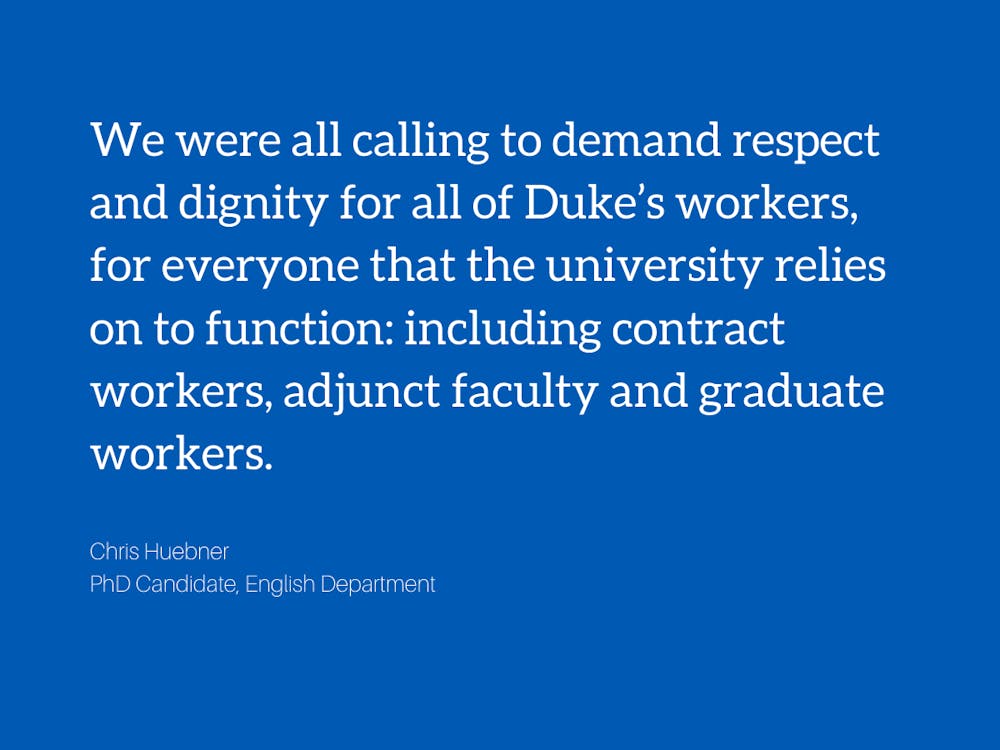Last Friday, I made a phone call to President Price. I left him a message, and then made another call to Provost Kornbluth. Dozens of my friends and colleague grad workers did the same. The Duke Graduate Students Union, Duke Contract Workers United, the Duke Faculty Union, Concerned Duke Alumni and other allies held a phone zap targeting Duke administrators to demand fair and safe working conditions amid the COVID-19 pandemic. In addition to Price and Kornbluth, we called Executive Vice President Trask, Vice President Cavanaugh and a few other decision-makers in support of a simple demand: to guarantee full pay for all workers, including subcontracted workers and grad workers, for the duration of the COVID-19 pandemic.
I made these calls for a few reasons. I was appalled to hear that hundreds of Duke workers have been laid off from university jobs or have had their work hours zeroed with no compensation after campus was closed for the semester. A similar situation befell a number of grad workers and faculty, many of whom I know personally. Their livelihoods have been put at risk after being unceremoniously fired from summer teaching and research assignments when the university announced that summer sessions would take place virtually. Closing campus and virtualizing instruction and research are obviously good public health decisions—but Duke has made them at the expense of members of its own community, putting our financial security and health at serious risk. Everyone at Duke deserves full pay and critical benefits like healthcare during this global crisis. It is absurd that workers even have to ask for this basic safety from Duke during times like these.
By Saturday afternoon, less than twenty-four hours after the conclusion of our event, I received an email from Provost Sally Kornbluth and Executive Vice Provost Jennifer Francis. It had been sent to Duke’s PhD students. In it, they promised to “provide [us] with specific information on issues of direct interest to graduate students.” Clearly, the collective message of the call-in had an effect.
But if this email were meant to reassure my colleagues and me that Duke is committed to our financial security, health and wellbeing during the COVID-19 pandemic, it missed the mark. Instead of giving any specifics, Provost Kornbluth only wrote that the administration is “working to identify virtual opportunities…to provide summer funding” and that they would give us more information in two to three weeks.
Further, as it has done time and again, the University shifted the responsibility for supporting graduate workers—whom I think ought to be considered with pride, rather than contempt, by the leaders of an R1 research institution—onto individual departments, many of which are already underfunded and overburdened. Instead of taking charge of the development and wellbeing of Duke’s graduate population, Provost Kornbluth let us know that she “asked department chairs to involve graduate students…as much as possible” in the transition needed to transform in-person courses to virtual classes.
This, of course, came after the Graduate School fired grad workers from their summer teaching jobs and forced them to reapply—under new, stricter guidelines on a more competitive basis with fewer instructorships available—for positions that they had already earned. My colleagues have been laid off from our teaching jobs, asked to reapply to them with no guarantee of pay and additionally design from-scratch “career development opportunities” for ourselves if we want even the chance of an income this summer.
So it’s clear that Duke’s administrators heard our calls for action. It’s also just as clear that they didn’t get the message. We need guaranteed pay for all Duke workers—at a very minimum, summer funding.
What makes the administration’s response to our demand particularly frustrating is that they’ve heard this before. In fact, they were the ones who proposed it. Last spring, the Dean of Duke’s Graduate School, Paula McClain, announced that the University would guarantee year-round funding for all grad workers. Dean McClain called the change “vital for the future of doctoral education at Duke.” But that change—vital as it is not just to the future of Duke but to the present of its many workers living through a global, life-upending pandemic—will not come until 2022. I wonder what the University is waiting for. If year-round funding is so vital, why doesn’t the administration consider it vital amid the COVID-19 outbreak?
Duke University has an endowment of over $8 billion, clearly enough money to provide a living wage for all its employees through the end of this pandemic. But the calls my colleagues, our allies and I made last Friday were about more than finances. We were all calling to demand respect and dignity for all of Duke’s workers, for everyone that the university relies on to function: including contract workers, adjunct faculty and graduate workers. We were calling for Duke’s administrators to live up to the high ethical standards of Duke’s own mission statement.
Chris Huebner is a Third Year PhD Candidate in the English Department and a member of the Duke Graduate Students’ Union.
Get The Chronicle straight to your inbox
Sign up for our weekly newsletter. Cancel at any time.

